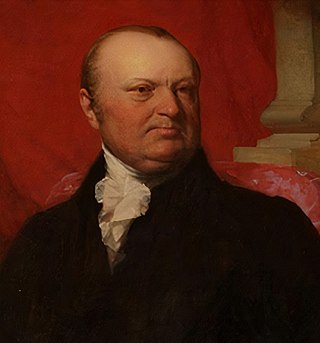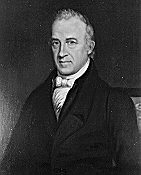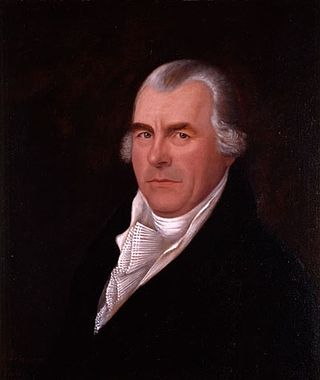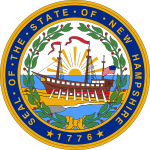
The 1816 United States presidential election was the eighth quadrennial presidential election. It was held from November 1 to December 4, 1816. In the first election following the end of the War of 1812, Democratic-Republican candidate James Monroe defeated Federalist Rufus King. The election was the last in which the Federalist Party fielded a presidential candidate.

John Taylor Gilman was a farmer, shipbuilder and statesman from Exeter, New Hampshire. He represented New Hampshire in the Continental Congress in 1782–1783 and was the fifth governor of New Hampshire for 14 years, from 1794 to 1805, and from 1813 to 1816.

William Plumer was an American lawyer, Baptist lay preacher, and politician from Epping, New Hampshire. He is most notable for his service as a Federalist in the United States Senate (1802–1807), and the seventh governor of New Hampshire as a Democratic-Republican.
The 1816–17 United States House of Representatives elections were held on various dates in various states between April 30, 1816 and August 14, 1817. Each state set its own date for its elections to the House of Representatives before the first session of the 15th United States Congress convened on December 1, 1817. The size of the House increased to 184 after Indiana and Mississippi achieved statehood.
Samuel Taggart was a Presbyterian Minister, an American politician and a U. S. Representative from Massachusetts.

Joseph Morrill Harper was an American physician, banker and Jacksonian politician in the U.S. state of New Hampshire. He served as a member of the United States House of Representatives, the New Hampshire State Senate and the New Hampshire House of Representatives and was acting governor of New Hampshire.
Benjamin Orr was a member of the United States House of Representatives from Massachusetts.

James Sheafe was a United States representative and Senator from New Hampshire. Born in Portsmouth in the Province of New Hampshire, he completed preparatory studies and graduated from Harvard College in 1774. He engaged in mercantile pursuits, was a member of the New Hampshire House of Representatives from 1788 to 1790, a member of the New Hampshire Senate in 1791, 1793 and 1799, and a member of the state Executive Council in 1799.
Clifton Clagett was an American lawyer and politician from New Hampshire. He served as a member of the New Hampshire House of Representatives, the United States House of Representatives and as a New Hampshire Supreme Court justice.
Caleb Ellis was an American politician and lawyer who served as a member of the United States Representative, representing the states's at-large congressional district.

Arthur Livermore was an American politician and attorney who served as a United States representative from New Hampshire.
Ichabod Bartlett was an American politician and a United States representative from New Hampshire.

William Merchant Richardson was a member of the U.S. House of Representatives from Massachusetts and chief justice of the New Hampshire Supreme Court.

Harry Hibbard was an American politician and a United States Representative from New Hampshire.
Daniel Meserve Durell was an American attorney and Democratic-Republican politician in the U.S. state of New Hampshire. He served as a member of the United States House of Representatives and as a member of the New Hampshire House of Representatives in the early 1800s.

Elijah Brigham was a U.S. Representative from Massachusetts.
John Adams Harper was an American politician and a United States Representative from New Hampshire.
Jonathan Harvey was an American farmer and politician from New Hampshire. He served as a member of the United States House of Representatives and the New Hampshire House of Representatives in the early 1800s.

Jeremiah Smith was a United States representative for New Hampshire, United States Attorney for New Hampshire, a United States circuit judge of the United States Circuit Court for the First Circuit, the sixth governor of New Hampshire and chief justice of the New Hampshire Superior Court of Judicature and the New Hampshire Supreme Judicial Court. He was a member of the Federalist Party.

The 1816 New Hampshire gubernatorial election was held on March 12, 1816.
This page is based on this
Wikipedia article Text is available under the
CC BY-SA 4.0 license; additional terms may apply.
Images, videos and audio are available under their respective licenses.











